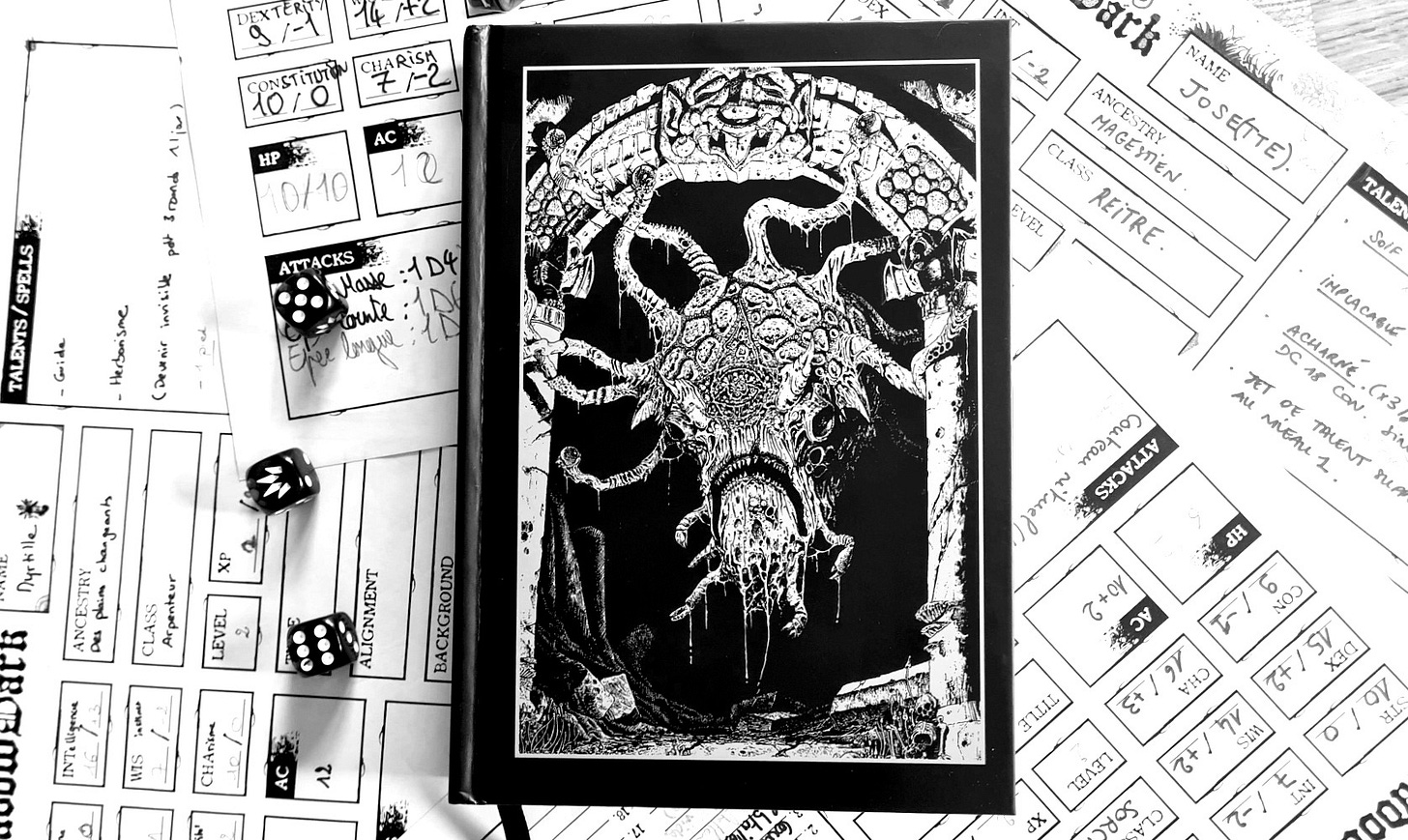Extraction #2 - Shadowdark
6/24/2025
Oy fellow cultists! Innoh here! Welcome to the second publication of my series Extraction. I pick a game that I like, and extract 5 of its many mechanics. The goal: creating a convenient library of fun and interesting systems. This could be really useful as a reference when creating new project.
Last time, I looked at Black Sword Hack ( here is the article ).
Today, here is Shadowdark, designed and written by Kelsey Dionne. I have a special relationship with this game, because I’ve played it so much, so so much!

Summary: Shadowdark
Shadowdark, due to its impressive fundraising campaign, is a game that has been talked about a lot. It must be said that Kelsey Dionne, its author, particularly with her site Arcane Library, is very active in the TTRPG community. Here, she offers a game that gets straight to the point, with effective rules and no frills, a love letter to TTRPGs as they were in the golden era.
Shadowdark is in the pure style of OSR games (some would even call it a variation of B/X). No overpowered characters with many feats but a more minimalist approach. It’s the player’s thinking that make the adventure, not the character sheet. We find the classic Gold and Treasure as XP, carousing, etc. This is indeed one of the selling points of the game: to offer an old-school experience to Dnd 5e players. The game could almost be considered rule light, so much it lightens the classical DnD system from which it derives. It is also full of random tables, to generate dungeons, wilderness and adventures. Tons of random encounters depending on the environment, and a complete bestiary that goes with it.In short, for a GM a little initiated in the OSR style, being able to launch a game almost instantly is a real pleasure.
Here is 5 points, among many others, that particularly got my interest, and that I was able to see working wonderfully in-game.
Table of contents:
-
Random talents
-
One-hour torch
-
Boons and secrets as XP
-
Game modes
-
Inventory management: 10 + STR
1) Random talents
Classes in Shadowdark are typically old-school. Few powers, a few rarely overpowered abilities. Warriors, for example, have a little more stamina, and a better mastery of weapons. Magicians can cast a few spells.
But there's a system that complements each class and that I find really fun to use: random talents. At level 1, 3, 5, etc, the player rolls 2D6 and draws an additional talent from a random table specific to each class.
For example, a warrior can gain mastery of a new weapon or increase his armour resistance. It is also possible to gain additional stats. For magicians, an additional spell, or the possibility of seeing one of their spells easier to cast, or even the creation of a magic item on the spot.
It's a clear system, which doesn't overload the sections dedicated to each class. It brings a major advantage:
-> despite the succinct classes, each character will evolve differently. This makes it easier to make them your own, and makes each character more original. Our warrior may become an expert in melee, while another will be focused on total defense.
Personal experience: In one of my campaigns, one of my players played a ranger. A character useless at everything, but really funny (his player too). There was, however, one point that made him indispensable. He was lucky enough to roll (on a 2) a talent that allowed him to inflict 1D12 damage with a weapon of his choice (in Shadowdark, a sword does 1D6 damage). And I can tell you that, in desperate situations, Frank the ranger becomes a real pillar for the other characters. Frank and his big javelin.
Another interesting aspect of this system is how easy it is to create new classes. Find one or two interesting but not too powerful general talents, then create a small table of random talents, and there you go.
2) One-hour torch
In Shadowdark, torches don't last a set number of rounds, but rather a real, real-life hour (lol). You light a torch, and you start a timer for the players.
This process is an excellent way to:
-
Give a tangible and physical component to the game.
-
Encourage players to make quick decisions.
-
Provide a deadline for the game session. (E.g., "We'll take a aperitif break when the torch goes out").
Here, finding yourself in the dark is almost synonymous with imminent death. Torches become a real resource to manage: they take up space in the players' inventory, they have a certain value, and there must be a wielder. You have to make the best use of them. I also find that by triggering a timer in real life, we bring part of the game's fantasy into reality, and this enhances immersion by blurring the boundaries a little. I can't count the number of times I've heard one of my players exclaim, "The torch goes out in 10 minutes, who brought more? This is going to be a pain! »
Oh, and it’s easier to track time than counting rounds.
3) Boons, secrets and oaths as a source of XP
We're all familiar with the typical Gold as XP reward from the OSR, which is very interesting because it offers players the opportunity to be rewarded without resorting to combat.
At the same time, I really appreciate the fact that players can consider other options to gain XP. For example, obtaining secret information, forming strong alliances with NPCs, or obtaining blessings.
Shadowdark provides a fairly comprehensive scale for judging the XP value of one of these benefits.
Normal - 1 XP - E.g., gaining access to the Thieves Guild HQ
Fabulous - 3 XP - E.g., a baron makes you a knight, with the benefits that go with it
Legendary - 10 XP - E.g., after an epic quest, the Moon Goddess grants you her power. On nights of a full moon, your strength is increased tenfold.
And it produces a surprising result: if they understand the principle, players will actually make the effort to engage with the game world, to talk to the NPCs, and develop the story. It's a true vector of roleplaying.
Once again, it's worth explaining this rule to the players, so they're aware and can make informed decisions.
Oh, and it also brings its share of debate to the table, but I like it. « Yeah, but we just learned that corruption can be contained thanks to an Orpheir artifact, that's worth 1 XP point, right? »
4) Game modes
An entire page is dedicated to game modes. In short, simple ways, explained in a few lines, to alter the overall game and the resulting feel. Making it more deadly, or combat-oriented, or more pulp, for example.
It's very interesting and practical for GMs to be offered a summary page on how to change the gaming experience. I haven't found this in other game systems yet. The author also encourages mixing modes to achieve gameplay specific to each table.
Example of game mode:
-> Hunter mode: killing monsters grants XP (as opposed to the typical Gold as XP of OSR).
-> Fatality mode: characters who reach 0 HP die immediately.
This is very useful for adapting the gaming experience to the type of game you want to offer. For a one-shot, why not combine Fatality Mode, Pulp Mode (players earn more Luck Tokens, and can thus re-roll certain rolls of their choice - including those of the GM) and Blitz Mode (torches only last 1/2 hour).
And If you let your players decide which mode to play with, this can be a good way for them to get involved in the game and its creation process.
5) Inventory management: 10 + STR
Inventory management in Shadowdark is simple and effective. The character can carry 10 items + their STR modifier. The mechanic works. It's clear, and players really wonder what they should leave behind to take the treasure they've just discovered. It's not too restrictive either; 10 slots (in general) still leave plenty of room for maneuver. The number 10 is elegant and quickly understandable, even for beginners.
And like any interesting rule, it really drives choice for players. Do I throw down my torches to take that magnificent silver vase? Who in the group can still carry something? At its own scale, it really participate in creating even more narration.
This is not the shiniest feature of Shadowdark to pick from, but creating a fine-tuned inventory system is such a complicated task that having some references of what could work is always a good choice. (don’t get me started with the weight system in Dnd).
What I like about Shadowdark is that the rules are clear and quantifiable. Torches last 1 hour, you can carry 10 items, a secret = 1 XP, etc. This makes for a game that's easy to play and can quickly get players on board.
Once again, there are many other very interesting rules and mechanics in the game. I encourage you to get it, in PDF or physical format (the book is really nice).
For the next article, I think this time I'll focus on Mörk Borg, the bad boy of TTRPGs!
Have a great day! The Cult of Magest is watching ☀️



